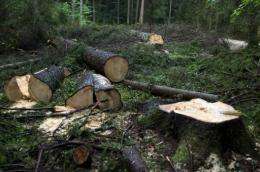Logging spells danger for Europe's last primeval forest

Deep in the forest, along a dirt road off-limits to tourists, the trunks of centuries-old fir trees lie waiting to be hauled to a sawmill -- felled giants from Europe's last primeval forest.
Further in, old oak and ash trunks wait to be turned into planks, furniture or matchsticks: proof, say ecologists, of illicit logging that is endangering the ancient Bialowieza forest in eastern Poland.
"Some of the trees have been cut down illegally by Poland's National Forests service, in violation of European Union legislation," contends Polish environmentalist Adam Bohdan, who with other campaigners has raised the alarm in Warsaw and Brussels.
State forestry officials deny any logging for commercial purposes in Bialowieza, saying only diseased or infested trees are being felled in the vast woodland area which is home to wild bison, lynx and wolves.
"We are also ecologists," says Andrzej Antczak, head of the Bialowieza forest service. "We log only to protect the forest from bark beetles -- insects that pose a grave danger to trees. We want to help nature defend itself and we do it according to Polish legislation," he insists.
Last year, forest authorities allowed the logging of some 100,000 cubic metres (3.5 million cubic feet) of wood in Bialowieza, or 0.35 percent of all timber produced in the country.
But ecologists are unconvinced. Last month, they filed a complaint with the European Commission against Poland for alleged non-conformity with EU environmental rules.
Days later, Greenpeace held a love-in for Bialowieza, hoisting a banner with an enormous heart reading "I love puszcza" (I love the forest) across the facade of the environment ministry in Warsaw.
The move paved the way to an agreement with the ministry to halt logging in Bialowieza until the end of last month.
Sprawling across 150,000 hectares, the Bialowieza forest reaches across the Polish border with Belarus, where it is entirely protected as a nature park.
Named a World Heritage site in 1979, it is home to 20,000 animal species, including 250 types of bird and 62 species of mammals -- among them Europe's largest, the bison.
Europe's tallest trees, firs towering 50 metres high (164 feet), and oaks and ashes of 40 metres, also flourish here, in an ecosystem untouched by human hand for more than 10 millennia.
"Bialowieza is unique. The forest has been there since the ice from the last Ice Age melted 12,000 years ago," explains Zdzislaw Szkiruc, director of the Bialowieza national park.
The park spreads over around 16 percent of the Polish part of the forest. Another 20 percent is strictly protected and the remainder is administered by Poland's state-run National Forests organisation.
Green activists have focused their energies on the battle to expand the designated national park area to cover the entire Polish part of the forest.
But the mayor of Bialowieza, a town of 2,400 residents, is lukewarm about the plans.
"We cannot forget about people who live near the forest," says Albert Litwinowicz.
"Residents are divided over the prospect of the park being expanded," he says. "Previous enlargements brought more inconveniences than advantages. The government promised money, but not a cent was paid into our coffers," he said.
"Today residents are afraid they won't be able to enter the park to gather mushrooms or berries as they have always done. Those who work in the woodland are afraid, they'll lose their jobs," the mayor explained.
What residents think matters because under existing legislation it is up to their local representatives to decide on the park's extension -- another thing that environmentalists would like to see change.
"Certainly, the Bialowieza forest doesn't belong only to us, it belongs to all Poles, it belongs to all of Europe and the residents of the region cannot be the only ones to decide about its future.
"But why should they be the only ones to pay the price?" asks Litwinowicz.
(c) 2010 AFP


















